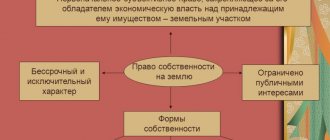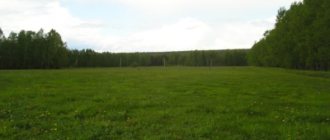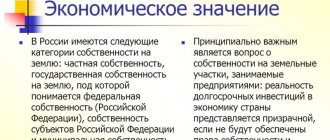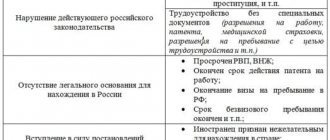What lands can foreign citizens and foreign companies acquire in the Russian Federation? What documents are needed to complete a land purchase and sale transaction?
The territory of the Russian Federation makes up one eighth of the earth's landmass. As follows from the reports of various departments, part of the land is overgrown with bushes, small forests and weeds, that is, it is not used for its intended purpose.
Land in the Russian Federation may be located:
- owned by citizens and legal entities (private property) (Article 15 of the Land Code of the Russian Federation);
- in state ownership (Article 16 of the Land Code of the Russian Federation);
- owned by the Russian Federation (federal property) (Article 17 of the Land Code of the Russian Federation);
- owned by constituent entities of the Russian Federation (Article 18 of the Land Code of the Russian Federation);
- in municipal ownership (Article 19 of the Land Code of the Russian Federation).
And according to their intended purpose, lands are divided into the following categories (Article 7 of the Land Code of the Russian Federation):
- agricultural land;
- lands of populated areas;
- lands of industry, energy, transport, communications, radio broadcasting, television, computer science, lands for space activities, lands of defense, security and lands of other special purposes;
- lands of specially protected areas and objects;
- forest fund lands;
- water fund lands;
- reserve lands.
Note that
in many countries the purchase of land for foreigners and foreign companies is prohibited, but companies with foreign capital are allowed.
AGREEMENT FOR PURCHASE AND SALE OF LAND
Can a foreigner or a foreign company buy a plot of land in Russia?
Let's turn to the basic law of the country - the Constitution of the Russian Federation.
Clause 3 of Article 62 of the Constitution of the Russian Federation stipulates that foreign citizens and stateless persons enjoy rights in the Russian Federation and bear responsibilities on an equal basis with citizens of the Russian Federation, except in cases established by federal law or an international treaty of the Russian Federation.
Important!
That is, the acquisition of real estate (which includes land plots) by foreigners is not prohibited. However, there are certain restrictions.
Foreign citizens and stateless persons are provided with ownership of land plots exclusively for a fee (Clause 4, Article 39.4 of the Land Code of the Russian Federation). A foreigner cannot purchase land in Russia free of charge.
CONTRACT LAWYER
Obtaining citizenship through the purchase of real estate in Russia
Russian legislation provides benefits when processing documents for certain categories of foreigners. For example, for those who are officially recognized as native speakers of Russian. However, if you want to obtain a residence permit in the Russian Federation, buying real estate will not help you with this.
Currently, the acquisition of real estate in Russia does not in any way affect the receipt of a residence permit or citizenship. In this case, the cost of real estate does not matter. However, it cannot be said that from a migration point of view, buying real estate would be a useless action, since you can register in it.
Buying real estate in Russia. Rights of foreigners
Foreigners and stateless persons can purchase real estate in Russia. However, there are several exceptions to this rule. A foreign citizen cannot buy:
- agricultural land plot;
- a plot in the forest fund;
- protected area;
- a site on the territory of a defense facility;
- real estate in border regions of Russia;
- real estate in closed administrative-territorial entities.
In all other cases, foreigners can buy apartments, houses, cottages, commercial premises, as well as land plots and dachas. The area of land, as well as the amount of real estate available for purchase by foreigners, is not limited by law.
Land ownership rights for foreign citizens
Foreign citizens in the Russian Federation enjoy legal capacity on an equal basis with citizens of the Russian Federation, except in cases established by federal laws (Article 1196 of the Civil Code of the Russian Federation).
Therefore, a foreign citizen has the right to buy land plots, but not all categories of land are available to him.
What lands can a foreign citizen own as property?
- Land plots for individual housing construction
- Land plots for personal farming
- Land plots on which a building, structure, structure owned by a foreign citizen is located
A foreign citizen can acquire ownership of these lands by inheritance or by acquisition of land plots owned by individuals or legal entities.
Foreign citizens - owners of buildings, structures, structures have the right to acquire ownership of land plots in the manner established by Art. 35, and in accordance with paragraph 2 of Art. 5, paragraph 3, art. 15 and paragraph 1 of Art. 22 of the Land Code of the Russian Federation.
Paragraph 5 of Article 35 of the Land Code of the Russian Federation regulates the right of foreign persons to receive land plots.
Within the meaning of the articles of the Land Code of the Russian Federation, these persons have the right to receive land plots on the right of ownership only in cases where a building, structure, structure that is the property of these persons is located on the land plot . The provision of plots free of development to these persons on the right of ownership or lease is not stipulated.
Based on the foregoing, we can conclude that the Land Code of the Russian Federation specifies the right of a foreign person to receive land plots on the right of ownership if there are buildings, structures or structures on these land plots that are his property. In other cases, when objects located on land plots are used by a foreign person under a different right, these land plots are provided for rent.
Restriction of land ownership rights of foreign citizens
1. Foreign citizens cannot have ownership of land plots located in border territories , the list of which is established by the President of the Russian Federation, and in other specially designated territories of the Russian Federation in accordance with federal laws.
The list of these land plots is fixed by Presidential Decree No. 26 dated January 09, 2011 and is a list of regions, territories, city districts, municipal districts and entities in which foreign citizens, stateless persons and foreign legal entities cannot own land plots.
2. Foreign citizens , foreign legal entities, stateless persons, as well as legal entities in the authorized (share) capital of which the share of foreign citizens, foreign legal entities, stateless persons is more than 50 percent, cannot own land plots from agricultural lands appointments by right of ownership. This is established by paragraph 5 of Article 1 of the Federal Law “On the turnover of agricultural land”.
3. From January 1, 2021, foreign citizens cannot be owners of lands provided to members of horticultural, gardening and dacha non-profit associations.
4. Foreign citizens cannot obtain free ownership of land that is in permanent (perpetual) use in other cases of free acquisition of land plots provided for by law for citizens of the Russian Federation.
5. As a general rule, foreign citizens can take advantage of the pre-emptive right to purchase a land plot when acquiring ownership of buildings, structures, structures from the list. But the President of the Russian Federation can approve a list of lands to which this rule will not apply (clause 5 of Article 35 of the Land Code of the Russian Federation).
6. Foreign citizens cannot have ownership of land plots located in state reserves, water bodies, forest zones, and infrastructure areas.
What does having real estate in Russia give to a foreigner?
When applying for a residence permit in the Russian Federation, the purchase of real estate does not provide benefits, as well as when resolving other issues of migration law. However, this does not mean that owning real estate does not increase your status. After all, you can register in the purchased property, and this is a prerequisite for obtaining a temporary residence permit.
In addition, if you have been living in Russia for more than 3 years and want a residence permit, you need to prove that you have a place to live and can provide for yourself financially. In this case, having your own real estate simplifies the procedure for obtaining a residence permit in the Russian Federation. After all, if you have an apartment or a house, you will definitely not be denied documents on the grounds that you have nowhere to live.
How the deal is completed
Registration of a transaction with a foreign citizen is carried out in exactly the same way as in the case of citizens of the Russian Federation. The procedure is standard: to transfer rights to real estate, you need to conclude a written agreement between authorized persons, as well as undergo state registration of the transfer of rights in Rosreestr.
If we are talking about acquiring rights to future real estate, the agreement itself is registered separately. This refers to entering into a construction share deal where you buy a property before it is actually built.
However, like Russian citizens, foreigners face all the risks associated with the purchase of real estate. Accordingly, if you buy an apartment or house on the secondary market, you need to check the legal purity of the property. Since there is no guarantee that minors or other persons whose rights may conflict with your interests are not registered there.
You also need to make sure that the person selling the property actually has the rights to do so, that he is the owner or his authorized representative. Thus, foreigners, like Russians, need the help of a competent lawyer.
The right to lease land from foreign citizens
As a general rule, foreign citizens and stateless persons can own land plots on a lease basis (clause 1 of Article 22 of the Land Code).
Foreign citizens, stateless persons, foreign companies and enterprises with a share of foreign ownership of more than 50% may own agricultural land plots only on a lease basis.
There is only one limitation here:
Foreign citizens, stateless persons and foreign legal entities - owners of buildings and structures located on someone else's land plot have a preferential right to lease a land plot. The President of the Russian Federation may establish a list of types of buildings and structures to which this rule does not apply (clause 5 of Article 35 of the Land Code).
Property tax
Persons who own real estate or equivalent property pay personal property tax. Garages, parking spaces, kiosks and similar architectural forms are considered to be equivalent to real estate property.
This is a local tax, that is, it is set by each municipality separately, so you need to clarify the rate in local regulations. To calculate the amount of tax, you need to know the cadastral value of your real estate, because it is based on this that the amount is calculated. Owners often resort to the procedure of challenging the cadastral value, because the mechanism for determining it often fails. But it greatly influences the final tax amount.
Taxes are paid separately when selling property. The income of an individual upon the sale of an apartment must be declared if it has been in his possession for less than 5 years.
It is worth remembering that if a foreign person is not a resident, that is, lives in the country for less than 183 days during the year, he pays tax at an increased 30 percent personal income tax rate.
But it is also necessary to check the existence of a double taxation agreement with the possibility of tax offset for a citizen of a particular country.
Latest legislative changes
From July 2021, they plan to issue a residence permit in the Russian Federation for the purchase of real estate. These legislative changes have not yet entered into force, but the government is considering an initiative to provide residence permits in the Russian Federation to foreign citizens who buy real estate here.
For now this is just an initiative. Accordingly, it is impossible to say what the procedure for obtaining a residence permit will be, whether the cost of real estate will affect it, or whether the procedure for transactions with foreigners will change. It is also unclear whether the legislative changes will affect all foreign property owners or only those who have acquired property in recent years. However, these innovations will not affect the procedure for obtaining citizenship.
In some countries, foreign citizens are not allowed to purchase land. How are things going in the Russian Federation? Foreign citizens can own real estate, however, the laws here provide for several exceptions, more on that.....
The Russian Constitution establishes that land is public property (Article 9). From the provisions of Art. 35 of the Constitution of the Russian Federation it follows that the subject of the constitutional right of private property can be anyone - both an individual (citizen, foreign citizen, stateless person) and a legal entity (commercial or non-profit organization, foreign organization) located on the territory of the state. In relation to the right of ownership of land, the Constitution of the Russian Federation in Part 1 of Art. 36 specifies that the subjects of this right include citizens of the Russian Federation and their associations. At the same time, the Land Code of the Russian Federation establishes restrictions on the ownership of land plots for foreign citizens. For example, foreigners are not granted ownership of plots of land in sanatorium and resort areas, where natural areas are under special protection. Foreigners in our country cannot own agricultural land. They can own such plots only on a leasehold basis. If the share of foreign capital in a company's authorized capital is more than fifty percent, then the lands intended for agricultural work are not provided to such a company. Foreigners are also not granted ownership of mineral resources, forests, and the continental shelf. These objects can only be provided to a foreigner for rent, and then only on condition that he has the appropriate license. From the above examples it is clear that the main type of land ownership in our country for a foreigner is renting a plot of land. But a foreigner can acquire ownership of a plot of land in Russia by inheritance or on other legal grounds. So, let's return to the legislation of the Russian Federation. Realizing its constitutional obligation, the federal legislator introduced some restrictions for foreign citizens, stateless persons and foreign legal entities in the exercise of land use rights, thereby establishing exceptions from the national regime for regulating the right of private ownership of land. Thus, paragraph 3 of Article 15 of the Land Code of the Russian Federation introduced a ban on the ownership of land plots located on the border and other territories of the Russian Federation for these persons. Decree of the President of the Russian Federation dated January 9, 2011 No. 26 (current version dated April 11, 2021) approved the list of border territories in which foreign citizens, stateless persons and foreign legal entities cannot own land plots. In the Krasnodar Territory, such territories include: Municipal entity Yeisk district, Municipal entity Kanevsky district, Municipal entity Mostovsky district, Municipal entity Primorsko-Akhtarsky district, Municipal entity Slavyansky district, Municipal entity Temryuk district, Municipal entity Tuapse district, · Municipal formation of Shcherbinovsky district, · Municipal formation of the city of Anapa, · Municipal formation of the resort city of Gelendzhik, · Municipal formation of the resort city of Novorossiysk, · Municipal formation of the resort city of Sochi. In connection with the publication of the Decree, the ban established by the Land Code of the Russian Federation on the ownership of land plots located in border areas by foreign citizens, stateless persons and foreign legal entities came into force. From the moment the Decree comes into force, that is, from January 9, 2011, these persons cannot possess such plots of land, regardless of the basis on which this right arises, that is, they can neither privatize such land plots nor acquire them ownership in any other way. The decree approved a specific list of territories to which the ban applies - this is the territory of 379 municipalities/districts/districts (plus the Kronstadt district of St. Petersburg). In particular, the list includes cities located in one way or another in certain proximity to the state border of the Russian Federation. This norm is mandatory, that is, the application of Part 3 of Article 15 of the Land Code of the Russian Federation is mandatory and cannot be circumvented in any way. So, the Law prohibits foreign citizens, stateless persons, as well as foreign legal entities from acquiring land in the border territories of the Russian Federation. However, consider the following situation..., before the Decree came into force, the current legislation allowed foreigners to acquire ownership of land plots in border areas from private owners on the basis of any transactions with the exception of privatization. It is not surprising that at the time the Decree came into force, a certain number of foreign owners of land plots appeared in the border areas. In order to analyze the possible fate of a land plot located in border areas and owned by a foreign citizen or a foreign legal entity, it is necessary to answer the question on what basis this land plot was acquired. Possible consequences for “illegal” owners. The ban on the privatization of state-owned land plots in border areas by foreign citizens and legal entities was in effect even before the Decree came into force. Consequently, there is a possibility that the person who acquired ownership of such a land plot through privatization did so in violation of the current legislation, which means there are grounds to classify such a transaction as invalid. According to the rules of the Civil Code of the Russian Federation, each party to an invalid transaction is obliged to return to the other party everything received under the transaction, and if it is impossible to return what was received in kind, to reimburse its value in money (taking into account the applicable statute of limitations). Thus, foreign citizens, stateless persons and foreign legal entities who illegally acquired land plots in border territories through privatization are clearly at risk, since they may lose these plots as a result of the application of the consequences of invalidity to the transactions they have concluded. Possible consequences for legal owners. Another group consists of foreign citizens, stateless persons and foreign legal entities who acquired land plots in border territories before the Decree came into force on the basis of a purchase and sale transaction from a private owner, by inheritance or on other legal grounds. Neither the Land Code nor the Decree contain special rules establishing the fate of land plots located in border territories that were legally acquired in one way or another by foreign citizens, stateless persons or foreign legal entities before the Decree came into force. On the one hand, the rights of these persons to the land plots they acquired must be protected by the general rule of law that the law does not have retroactive effect. However, we must not forget about the rules contained in the Civil Code of the Russian Federation in relation to property limited in circulation, since due to the restrictions established by the Land Code, land plots located in border territories can be qualified as such property. According to Art. 238 of the Civil Code, if a person has this kind of property legally, but this person is legally deprived of the opportunity to possess it by right of ownership, such property must be alienated by the owner within a year from the moment the right of ownership to the property arises, unless otherwise established by law term. In cases where the property is not alienated by the owner in a timely manner, such property, taking into account its nature and purpose, by a court decision made at the request of a state body or local government body, is subject to forced sale with the transfer of the proceeds to the former owner or transfer to a state or municipal property with compensation to the former owner for the value of the property determined by the court. In this case, the costs of alienation of property are deducted (clause 2 of the said article of the Code). Possibility of applying Art. 238 of the Civil Code of the Russian Federation raises many questions about the situation under consideration, since the one-year period specified in it may not be relevant (after all, at the time the Decree entered into force, the land plot could have been legally owned by such a foreign person for more than a year). However, the fact that this norm exists in the current legislation of the Russian Federation does not currently allow us to draw an unambiguous conclusion that the rights of foreign citizens, stateless persons and foreign legal entities that have legally acquired land plots in border areas will not be affected in any way due to the adoption of the Decree . The ambiguity of the current situation can probably be resolved either by the formation of judicial practice, or by the adoption by the legislator of special normative legal acts regulating the future fate of land plots in border territories that are owned by foreign citizens or legal entities, or by the adoption by authorized authorities of official clarifications regarding the application to this situation of the current legislation of the Russian Federation. Arbitrage practice . Courts generally correctly apply the norms of substantive law, in particular, the provisions of Articles 3, 5 of the Law on the Turnover of Agricultural Land, paragraph 3 of Article 15 of the Land Code of the Russian Federation. In cases of this category, judges checked whether the citizenship of the defendant had changed, whether by the time the case was considered, he had not completed a transaction to alienate a land share or land plot and, accordingly, whether he still had the obligation to sell the land plot. For example, by the decision of the Oktyabrsky District Court of Novorossiysk dated February 11, 2021 (case No.) on the claim of the prosecutor of the city of Novorossiysk, citizen Aglinishkis V.V. forced to sell his shares in the right of common ownership of a land plot of agricultural land with cadastral number No., located at the address: .... In making this decision, the court correctly proceeded from the fact that the defendant Aglinishkis V.V. is a citizen of a foreign state, his ownership of the disputed land shares was registered on March 29, 2005 and April 15, 2005, and within a year from the date of state registration of the right, the defendant did not alienate the land shares. At the same time, it should be noted that when making a decision at the request of a government body of a constituent entity of the Russian Federation to force the owner to sell a land plot or a share in the right of common ownership of a land plot of agricultural land, the operative part must indicate the sale of such land plot. at auctions (competitions, auctions), since this is the procedure established by Article 5 of the Law on the Turnover of Agricultural Land. For foreign citizens and organizations, there are still restrictions on the exercise of land use rights in relation to land plots located on the border territories of the Russian Federation, the list of which is established by the President of the Russian Federation in accordance with the federal legislation on the State Border of the Russian Federation and in the case where the property is not alienated by the owner, such property subject to forced sale with the transfer of the proceeds to the former owner or transfer to state or municipal ownership with compensation to the former owner for the value of the property determined by the court.










